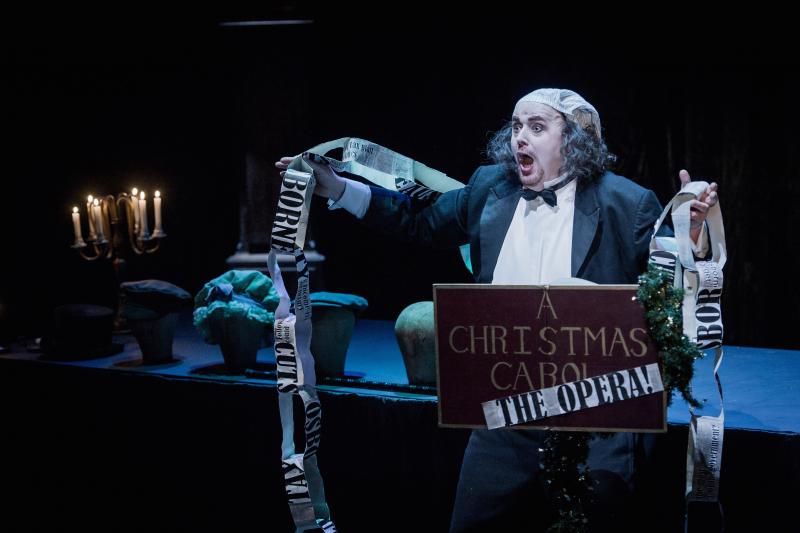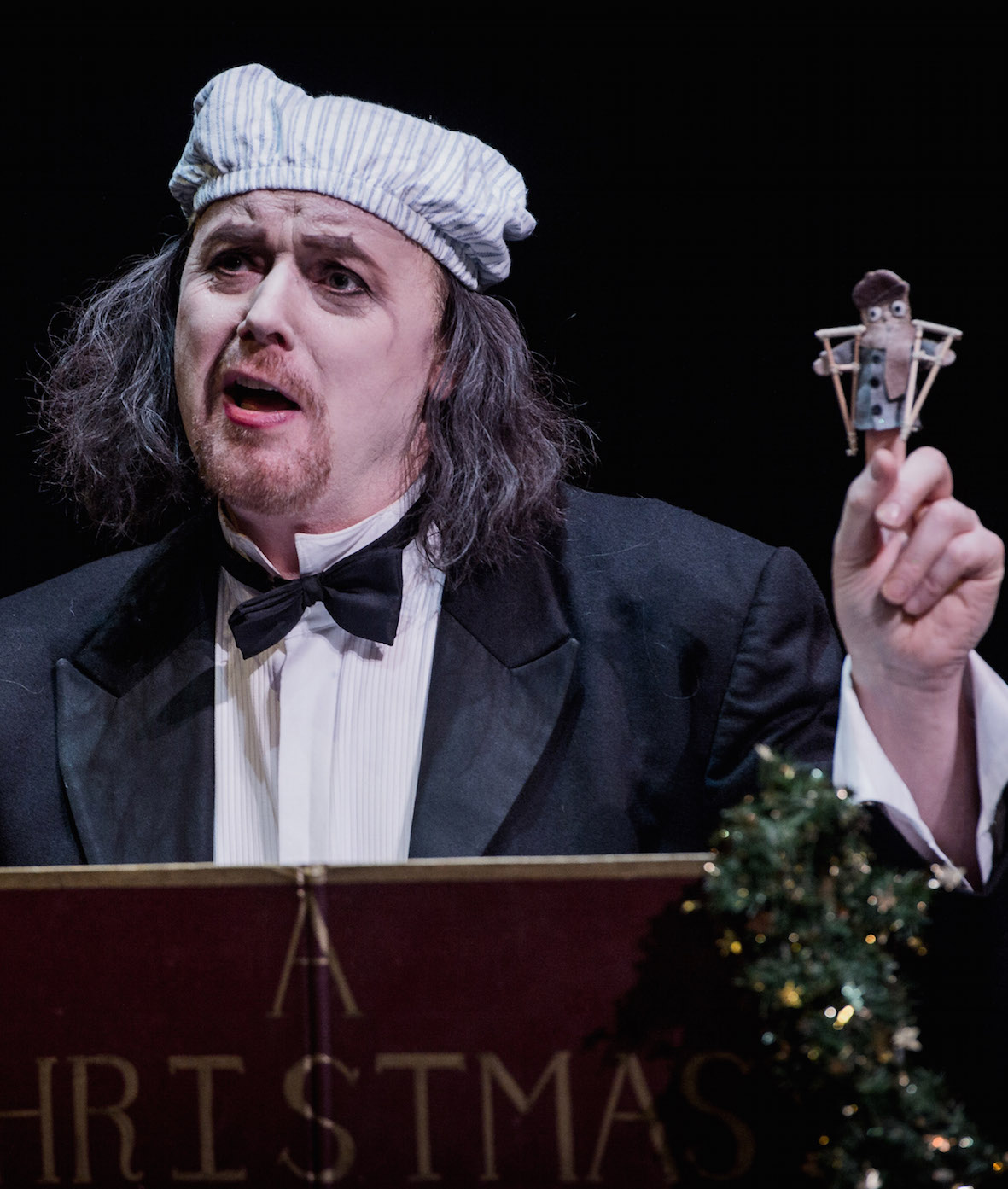A Christmas Carol, Welsh National Opera | reviews, news & interviews
A Christmas Carol, Welsh National Opera
A Christmas Carol, Welsh National Opera
Dickensian Christmas as one-man opera only half a good idea

Dickens’s public readings from his novels were almost as famous and popular as the novels themselves. He would write special scripts that gave prominence to particular characters and that dramatized the salient events of each story; and of all these performances, A Christmas Carol was one of the favourites, his and his audiences’.
Iain Bell’s opera, new last year but performed here for the first time in the Weston Studio of Cardiff’s Millennium Centre on Friday, is the answer to that question. The idea, it turns out, is only half good. For a speaker, whether the author or, recently and brilliantly, Simon Callow treading page-like in his steps, it works because for an actor being alone with a script on an empty stage is both liberating and a kind of implied triumph over all the other actors who aren’t there to get in your way.
For a singer the situation is very different. He (in this case) is the prisoner of the score and the orchestra; he cannot deviate, hesitate or repeat. He simply has to get it right, no easy matter in a 90-minute monologue against a complex and not altogether considerate orchestral score.
So great praise for tenor Mark Le Brocq for surviving this challenge, generally making sense of it, and turning it into a genuine entertainment, holding the stage in the guise of the author with bald pate and bushy side hair, an array of hats, cloaks, shoes, a finger puppet for never-so-Tiny Tim, and an Olympiad of dashes and leaps, Roger-de-Coverley dance steps, and squeaky children’s voices, that would surely have delighted Dickens’s audience as much as it delighted WNO’s.
 Le Brocq (pictured right with Tiny Tim) is a stage natural. So long as he was playing to the audience, hauling up pretty girls from the front stalls or kissing them under the mistletoe, gesticulating to the conductor, or drumming up applause for simply changing his coat, he was in his element. But skilful and powerful singer though he is, he couldn’t wholly disguise the vocal problems in Bell’s writing. The opera calls for huge stamina. Yet Bell often writes for his 15-piece chamber orchestra as if the singer weren’t there.
Le Brocq (pictured right with Tiny Tim) is a stage natural. So long as he was playing to the audience, hauling up pretty girls from the front stalls or kissing them under the mistletoe, gesticulating to the conductor, or drumming up applause for simply changing his coat, he was in his element. But skilful and powerful singer though he is, he couldn’t wholly disguise the vocal problems in Bell’s writing. The opera calls for huge stamina. Yet Bell often writes for his 15-piece chamber orchestra as if the singer weren’t there.
Absurdly, his most delicate effects – such as the exquisite opening to the second act – are reserved for moments when the voice is silent. The voice strikes up and the orchestra competes. Listening to the orchestra, there is much to enjoy of an anecdotal kind; but listening to the singer can be as wearing as it must be for him singing this music. Could one follow the ins and outs of the story without having read it? I have my doubts.
Polly Graham’s direction here was lively and atmospheric, nicely if sometimes erratically lit by Ceri James, and straightforwardly designed by Nate Gibson. Graham might have thought of thematizing Le Brocq’s frequent use of a score, presumably as an aide memoire. After all, Dickens must surely have read from a text, however freely. James Southall conducted attentively and painstakingly, and the players did their best to tone down Bell’s more obvious excesses. But in the end a score is a chastity belt for which only the composer holds the key. And at the crucial moment he, in Derrida’s sense, is absent.
Bell has another new opera coming up for WNO in June: a setting of David Jones’s prose poem In Parenthesis. Whether this will have a narrative format like A Christmas Carol I’ve no idea, but I hope the singers will be given more musical space.
The future of Arts Journalism
You can stop theartsdesk.com closing!
We urgently need financing to survive. Our fundraising drive has thus far raised £49,000 but we need to reach £100,000 or we will be forced to close. Please contribute here: https://gofund.me/c3f6033d
And if you can forward this information to anyone who might assist, we’d be grateful.

Subscribe to theartsdesk.com
Thank you for continuing to read our work on theartsdesk.com. For unlimited access to every article in its entirety, including our archive of more than 15,000 pieces, we're asking for £5 per month or £40 per year. We feel it's a very good deal, and hope you do too.
To take a subscription now simply click here.
And if you're looking for that extra gift for a friend or family member, why not treat them to a theartsdesk.com gift subscription?
more Opera
 Madama Butterfly, Irish National Opera review - visual and vocal wings, earthbound soul
Celine Byrne sings gorgeously but doesn’t round out a great operatic character study
Madama Butterfly, Irish National Opera review - visual and vocal wings, earthbound soul
Celine Byrne sings gorgeously but doesn’t round out a great operatic character study
 theartsdesk at Wexford Festival Opera 2025 - two strong productions, mostly fine casting, and a star is born
Four operas and an outstanding lunchtime recital in two days
theartsdesk at Wexford Festival Opera 2025 - two strong productions, mostly fine casting, and a star is born
Four operas and an outstanding lunchtime recital in two days
 The Railway Children, Glyndebourne review - right train, wrong station
Talent-loaded Mark-Anthony Turnage opera excursion heads down a mistaken track
The Railway Children, Glyndebourne review - right train, wrong station
Talent-loaded Mark-Anthony Turnage opera excursion heads down a mistaken track
 La bohème, Opera North review - still young at 32
Love and separation, ecstasy and heartbreak, in masterfully updated Puccini
La bohème, Opera North review - still young at 32
Love and separation, ecstasy and heartbreak, in masterfully updated Puccini
 Albert Herring, English National Opera review - a great comedy with depths fully realised
Britten’s delight was never made for the Coliseum, but it works on its first outing there
Albert Herring, English National Opera review - a great comedy with depths fully realised
Britten’s delight was never made for the Coliseum, but it works on its first outing there
 Carmen, English National Opera review - not quite dangerous
Hopes for Niamh O’Sullivan only partly fulfilled, though much good singing throughout
Carmen, English National Opera review - not quite dangerous
Hopes for Niamh O’Sullivan only partly fulfilled, though much good singing throughout
 Giustino, Linbury Theatre review - a stylish account of a slight opera
Gods, mortals and monsters do battle in Handel's charming drama
Giustino, Linbury Theatre review - a stylish account of a slight opera
Gods, mortals and monsters do battle in Handel's charming drama
 Susanna, Opera North review - hybrid staging of a Handel oratorio
Dance and signing complement outstanding singing in a story of virtue rewarded
Susanna, Opera North review - hybrid staging of a Handel oratorio
Dance and signing complement outstanding singing in a story of virtue rewarded
 Ariodante, Opéra Garnier, Paris review - a blast of Baroque beauty
A near-perfect night at the opera
Ariodante, Opéra Garnier, Paris review - a blast of Baroque beauty
A near-perfect night at the opera
 Cinderella/La Cenerentola, English National Opera review - the truth behind the tinsel
Appealing performances cut through hyperactive stagecraft
Cinderella/La Cenerentola, English National Opera review - the truth behind the tinsel
Appealing performances cut through hyperactive stagecraft
 Tosca, Royal Opera review - Ailyn Pérez steps in as the most vivid of divas
Jakub Hrůša’s multicoloured Puccini last night found a soprano to match
Tosca, Royal Opera review - Ailyn Pérez steps in as the most vivid of divas
Jakub Hrůša’s multicoloured Puccini last night found a soprano to match
 Tosca, Welsh National Opera review - a great company reduced to brilliance
The old warhorse made special by the basics
Tosca, Welsh National Opera review - a great company reduced to brilliance
The old warhorse made special by the basics

Add comment